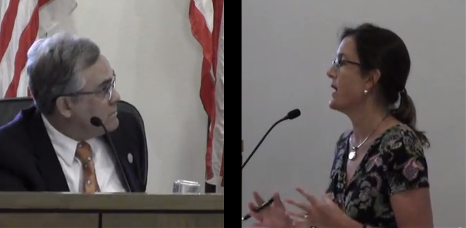 At last Monday’s City Commission meeting it was clear that the key players in the Winter Park’s historic preservation drama had decided to moderate the tone of the debate. At last Monday’s City Commission meeting it was clear that the key players in the Winter Park’s historic preservation drama had decided to moderate the tone of the debate.
Mayor Bradley singled out Casa Feliz as a “wonderful example of private preservation” and complimented Casa Feliz and the WP Historical Association for “releasing a beautiful letter to the Commission last Thursday . . . [ confirming ] that we all share like goals. This doesn’t need to be a vilified process in our city. This is something that we all need to be working together on . . .” The email “letter” can be viewed by clicking the button below.
Letter to City
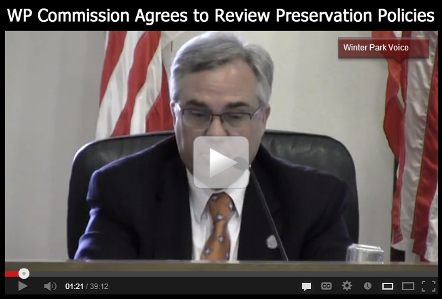 The Mayor suggested that the Commission meet as necessary to examine Winter Park’s Historic Preservation policies – and “to look from 2001 to the present and [ determine ] what has and hasn’t worked.” Bradley called for an inventory of all historic places in Winter Park and a study of why some city residents do not place their properties on a historic registry. He also called for involvement by the city’s Historic Preservation Board, Economic Development Advisory Board and Planning & Zoning Board to look at preservation standards, the economic value of preservation and the city’s building demolition policy. The Mayor suggested that the Commission meet as necessary to examine Winter Park’s Historic Preservation policies – and “to look from 2001 to the present and [ determine ] what has and hasn’t worked.” Bradley called for an inventory of all historic places in Winter Park and a study of why some city residents do not place their properties on a historic registry. He also called for involvement by the city’s Historic Preservation Board, Economic Development Advisory Board and Planning & Zoning Board to look at preservation standards, the economic value of preservation and the city’s building demolition policy.
McMacken & Blydenburgh: Let’s Create Task Force to Look at Preservation Policy Changes.
Commissioner McMacken followed Mr. Bradley’s opening statement with an acknowledgement of another email received just prior to the Commission meeting. That email, sent by former Historic Preservation Board member, Jeffrey Blydenburgh, proposed a “Task Force [ that ] will listen to the broad community regarding heritage and preservation and make recommendations to achieve the desired outcome (ordinance, code, planning guidelines, etc) to present to the commission.”
The emailed proposal was signed by Betsy Owens, the Chamber’s Patrick Chapin and others. Blydenburgh also addressed the Commission during the Public Comment period. His testimony can be viewed by clicking the video image above. Blydenburgh’s email can be viewed by clicking the button below.
Task Force Email
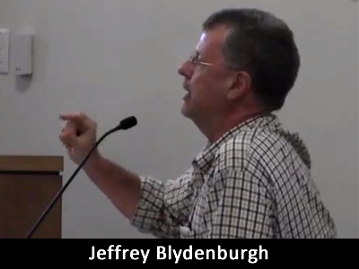 Commissioner McMacken supported the idea of creating a Task Force stating that “This really needs to be a community conversation that perhaps this Task Force . . . would come back to us and say ‘Here’s what we value in our city’.” McMacken expressed some misgivings about the Mayor’s idea to examine and shape policy depending largely on the city’s advisory boards, saying “I’m a little hesitant of putting it out to four or five different boards.” McMacken suggested that the Task Force may be better suited to make recommendations “in a more coherent form.” Commissioner McMacken supported the idea of creating a Task Force stating that “This really needs to be a community conversation that perhaps this Task Force . . . would come back to us and say ‘Here’s what we value in our city’.” McMacken expressed some misgivings about the Mayor’s idea to examine and shape policy depending largely on the city’s advisory boards, saying “I’m a little hesitant of putting it out to four or five different boards.” McMacken suggested that the Task Force may be better suited to make recommendations “in a more coherent form.”
Mayor Bradley countered that a Task Force may inadvertently recommend actions that could create “legal liabilities” for the city, implying that city boards – with responsibility for, and understanding of, code enforcement – are less likely to create ordinances that create liabilities for the city.
Bradley & Leary: Historic Preservation and Economic Development Boards Well-Suited to Study Ordinances.
Commissioner Leary supported the Mayor’s position saying that appointment of a Task Force would be “a slap in the face” of the Historic Preservation Board. Leary also agreed with the Mayor that the Economic Development Advisory Board and city staff were well-suited to the task. Mayor Bradley added that the city’s 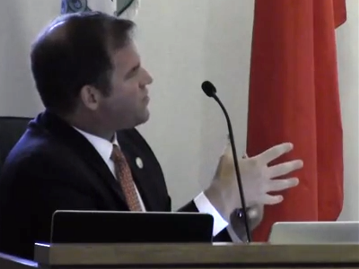 ordinances may not need to be changed, speculating that they may be “up to muster and up to speed – and what we have is an implementation issue.” Commission Commissioner Cooper agreed with the Mayor on implementation being an issue, saying “I think that’s exactly what we have . . .” ordinances may not need to be changed, speculating that they may be “up to muster and up to speed – and what we have is an implementation issue.” Commission Commissioner Cooper agreed with the Mayor on implementation being an issue, saying “I think that’s exactly what we have . . .”
Ms. Cooper also indicated her support of Mr. McMacken’s Task Force suggestion and recounted her experience on the Planning & Zoning Board working with a Task Force that brought needed expertise to the board rather than seeking to replace the board’s function. “They were helping us and advising us . . . Our boards are wonderful, but they’re not all experts in the field – and we can get people who are [ experts ] . . .”
Sprinkel: Preservation Policy Should “be owned by this entire community – one little board can’t own this.”
Commissioner Sprinkel reminded the Commission of the documentation and recommendations generated by past studies and quipped that “They made recommendations that perhaps we wouldn’t be here today if we’d followed those recommendations.” Sprinkel suggested that the Commission should start the process with a city board and utilize a “Task Force concept” by inviting community input. Sprinkel added that “This is something that needs to be owned by this entire community – one little board can’t own this.”
 Later in the hearing, Commissioner Cooper brought the discussion back to the issue that has generated so much community passion and scrutiny of the city’s policies and actions – the threatened demolition of Capen House. Cooper pointed out a city code provision that, had it been implemented, might have resulted in a closer look at what would be lost and what would be gained by granting SunTrust Bank’s request to rescind the Historic Registry status of Capen House: “One of the functions that our code allows is that the Historic Preservation Board is to recommend for or against demolitions on properties that are on the Florida Master Site File Plan. Well the Capen House was there – but somehow . . . it fell off the radar.” Later in the hearing, Commissioner Cooper brought the discussion back to the issue that has generated so much community passion and scrutiny of the city’s policies and actions – the threatened demolition of Capen House. Cooper pointed out a city code provision that, had it been implemented, might have resulted in a closer look at what would be lost and what would be gained by granting SunTrust Bank’s request to rescind the Historic Registry status of Capen House: “One of the functions that our code allows is that the Historic Preservation Board is to recommend for or against demolitions on properties that are on the Florida Master Site File Plan. Well the Capen House was there – but somehow . . . it fell off the radar.”
The code provision Cooper referred to appears to be Sec. 58-446, “Functions, powers and duties of the historic preservation board.” The first power that is enumerated in this section of Winter Park’s Code of Ordinances is as follows:
|
“The historic preservation board shall be responsible for the development and administration of a comprehensive historic preservation program, and shall identify and maintain the city’s historic resources for the benefit of both present and future residents. It shall be the responsibility of the HPB to:
(1) Provide or recommend incentives for historic preservation, and to recommend for or against rezonings, demolitions, developments, lot splits, lot consolidations, or conditional uses that could impact historic resources identified in the Florida Master Site File survey of the City of Winter Park.” |
|
Bradley: “Capen House is obviously a rallying cry and a call. It’s being dealt with – I hope . . . “
Mayor Bradley closed the hearing by noting efforts by city residents to deal with the preservation of Capen House by using private, rather than public, resources: “Capen House is obviously a rallying cry and a call. It’s being dealt with – I hope . . . and if the city needs to be involved, we’ll figure out a way to be involved if we have to, but there’s a private solution. Those frankly are normally the best solutions . . .”
In the “Public Comments” section of the meeting that followed the hearing, Casa Feliz Director, Betsy Owens spoke about the effect the Capen House controversy has had on the city:
|
“With all due respect, I feel that the events in recent weeks have caused our community to lose faith in our government’s ability to protect our historic resources in Winter Park . . . I believe that by establishing a bottom-up approach, reaching wide to bring in members from the community at large – from the Chamber of Commerce, from Casa Feliz, from the realtors, from a bunch of different designated groups – it will go a long way to instill the confidence of our citizenry in the government’s ability to protect our culture and heritage in Winter Park, and also promote the healing that is so sorely needed.” |
|
Ms. Owens’ testimony can be viewed by clicking the video image at the top of the page. Earlier this week, in her Preservation Winter Park blog, Owens explained the efforts by private parties – spearheaded by Owens and her group – to work with the Pokorny family, “We want to assure the public that the Friends organization is working diligently, in cooperation with the attorneys for the property owners, to explore viable options for the Capen House. We are grateful that the owners have entrusted the Friends with developing a plan for their consideration.”
6/14/13 Story Update

 If Winter Park’s Commissioners were a bit wary on Monday as they watched Capen House supporters file into the chamber, their business-as-usual demeanor did not betray them. If Winter Park’s Commissioners were a bit wary on Monday as they watched Capen House supporters file into the chamber, their business-as-usual demeanor did not betray them.
The Commission meeting started out as usual, with the audience patiently waiting through plaques & proclamations. This time, city business included a plea from Commissioner Cooper to halt new restaurant permits until the city’s fast food policy can be worked out. Shortly after Cooper’s request fizzled with her fellow Commissioners, Mayor Bradley announced that the Commission was ready to consider the question the audience was waiting for: Deciding the city’s position on the impending demolition of Capen House.
Once the Capen House discussion got under way, occasional rumblings from the audience notched up the tension on the dais sending a strong message that the Commissioners were in for a bumpy night.
A couple of hours into the meeting, the Commissioners sent their own message to Capen House preservationists: We did nothing wrong in rescinding the home’s Historic Designation and will leave it to the Pokorny family – the current owners of Capen House – to decide its fate.
Pokorny Attorney: Give Us Demo Permit – We’ll Give Capen House 30 days to Find New Home.
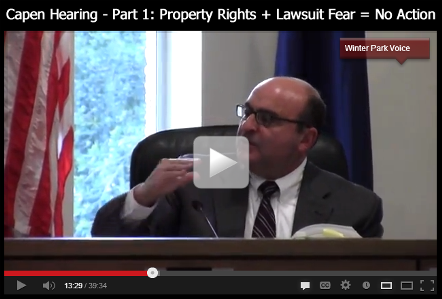 The Commission reached this decision after Pokorny lawyer, Trippe Cheek, offered preservationists a month to submit an acceptable plan to move Capen House while still insisting on the right of his clients to tear down the historic home 30 days after the demolition permit is issued – if they decide not to accept any proposed plan. The Commission reached this decision after Pokorny lawyer, Trippe Cheek, offered preservationists a month to submit an acceptable plan to move Capen House while still insisting on the right of his clients to tear down the historic home 30 days after the demolition permit is issued – if they decide not to accept any proposed plan.
As noted by the city Building Director George Wiggins, the permit won’t be issued for another couple of weeks – the time he estimated it will take the Pokornys to properly terminate all utilities at the property. Wiggins explained that the Pokornys had not yet requested the utility disconnects, commenting that “The ball’s in their court.”
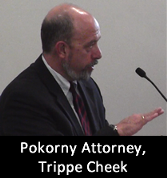 Attorney Cheek went on to propose that “I don’t think you ought to take any action, to tell you the truth. I’m not sure what action you could take considering it [demolition permit hearing] wasn’t agenda’d anyway.” Attorney Cheek went on to propose that “I don’t think you ought to take any action, to tell you the truth. I’m not sure what action you could take considering it [demolition permit hearing] wasn’t agenda’d anyway.”
Cheek’s assertion created a question of whether any Capen House action in Monday’s Commission meeting was legally appropriate and binding, suggesting that the item had not been placed on the agenda in a timely and proper manner.
After subtly questioning the legitimacy of any Commission action in Monday’s meeting, attorney Cheek repeated his 30 day offer which was applauded by Mayor Bradley who volunteered that “For me this is certainly good news.”
Bradley: 30 Day Offer is “Good News.”
 Commissioner Sprinkel immediately echoed Bradley’s sentiment, adding that the 30 day concession was “Very good news.” Commissioner Sprinkel immediately echoed Bradley’s sentiment, adding that the 30 day concession was “Very good news.”
Prior to the testimony of Pokorny’s attorney, debate among the Commissioners was earnest, occasionally spirited and sometimes defensive. The Mayor and Commissioners focused significantly on questions of legal procedure, application timelines and property rights.
Tom McMackin recounted his memory of handling the initial 2006 Historical Designation of Capen House, which was endorsed in a unanimous vote of the Historical Preservation Board that he chaired at the time.
 McMackin summed up the feeling of some in the preservation community that Capen House “may not be the greatest of historical structures, but it’s one of ours and that may be as historic as we get in this community.” McMackin summed up the feeling of some in the preservation community that Capen House “may not be the greatest of historical structures, but it’s one of ours and that may be as historic as we get in this community.”
Commissioner Leary argued most passionately for the interests of Pokornys and SunTrust Bank, claiming “I know the property owners [the Porkornys]. They are great people. They do more for charity. They did not buy this house with the intent to demolish it . . . having, again, residents of our city maligned for just doing what’s in their best interests and what they are entitled to do is a little disconcerting to me.”
 Leary admitted his fear of litigation by the Pokornys stating that “I don’t need a $40 million lawsuit/judgment against the city.” Leary admitted his fear of litigation by the Pokornys stating that “I don’t need a $40 million lawsuit/judgment against the city.”
Speaking in support of SunTrust’s actions in the case, Commissioner Leary asserted that “The bank, they chose the best offer . . . the best offer may not have been the highest offer, the best offer also includes terms – they chose that and now we’re sitting here discussing legislating against a private property matter and it’s a little disturbing . . . we made the right decisions for the property owners that were presenting their case.”
City Attorney Offers Commission a Way to Delay Demolition. No Takers.
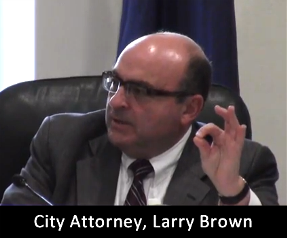 During a discussion of alternatives the city could pursue, City Attorney Larry Brown revealed that the Commission did, in fact, have a legally defensible way to delay the demolition of Capen House for 30 to 60 days. Brown commented that, if challenged in court, a delay by the city in defense of community interests probably would be ruled appropriate – with a likely worst case awarding minimal damages to the Pokornys. However, Brown warned that a longer delay would put the city in jeopardy. During a discussion of alternatives the city could pursue, City Attorney Larry Brown revealed that the Commission did, in fact, have a legally defensible way to delay the demolition of Capen House for 30 to 60 days. Brown commented that, if challenged in court, a delay by the city in defense of community interests probably would be ruled appropriate – with a likely worst case awarding minimal damages to the Pokornys. However, Brown warned that a longer delay would put the city in jeopardy.
As the Commission eased itself into the position that doing nothing, for now, might be their best approach, talk on the dais turned to what might be done when and if a private deal was put together to move the house. Commissioner Cooper asked whether the city was willing to consider using city land as a final resting place for Capen House. Mayor Bradley mentioned the possibility that the historic home could sit next to the city’s clubhouse at the golf course.
Sprinkel: Citizen Email/News Coverage Hurtful. Bradley: I’m “Grossly Disappointed” in Some Citizens.
 Sarah Sprinkel, clearly relieved that the city would not be fighting this particular battle, commented “I think this went very well.” She then revealed the strain of dealing with the onslaught of email and negative community sentiment this issue has generated: “It has been very hard to read – not just the paper – but all the emails that have been very blaming. It’s been a very hurtful thing for us and for everybody . . . I hope that everybody out there can move forward with this and stop the blaming.” Sarah Sprinkel, clearly relieved that the city would not be fighting this particular battle, commented “I think this went very well.” She then revealed the strain of dealing with the onslaught of email and negative community sentiment this issue has generated: “It has been very hard to read – not just the paper – but all the emails that have been very blaming. It’s been a very hurtful thing for us and for everybody . . . I hope that everybody out there can move forward with this and stop the blaming.”
Mayor Bradley added to Commissioner Sprinkel’s comments later in the meeting with a final comment of his own on the Capen House affair. The Mayor complimented the actions of his fellow Commissioners, then characterized “many” of the Capen House advocates who had sent email to the Commission as writing email that was “accusatory” and “nasty.” Bradley also laid blame on “a lot of organizations” as having “contributed” to the expression of opinions that had “grossly disappointed” him. Video of the Mayor’s comments can be viewed by clicking the “Capen Hearing – Part 3” video at the end of this story.
Cooper: Finds Pokorny Offer to be “Encouraging.” Calls on City to Help Re-Locate Capen House.
 Sprinkel’s expression of relief and hope for reconciliation were followed by Commissioner Cooper’s call for a re-examination of the city’s Historic Preservation ordinance and a request that the city study ordinances in cities renowned for their preservation efforts – cities like Coral Gables and St. Augustine. Mayor Bradley agreed that the Commission should set aside time at the next Commission meeting to discuss preservation rules and procedures. Sprinkel’s expression of relief and hope for reconciliation were followed by Commissioner Cooper’s call for a re-examination of the city’s Historic Preservation ordinance and a request that the city study ordinances in cities renowned for their preservation efforts – cities like Coral Gables and St. Augustine. Mayor Bradley agreed that the Commission should set aside time at the next Commission meeting to discuss preservation rules and procedures.
A palpable sense of relief seemed to wash over the dais as Commissioners looked to future actions that might defuse community angst and lead to more effective preservation efforts. Commissioner Cooper looked out over the audience as she applauded the concessions made by the Pokorny family, saying “I’m glad that the owners are really trying to help . . . that’s very encouraging . . .” Cooper then alluded to possible help the city could offer in finding a piece of land for Capen House and spoke of her hope that “it might be a great way to bring the community together to try and do something, and certainly it helps us learn lessons about what we have to do to fix this ordinance.”
Public Comment: Audience Not So Encouraged by Commission’s Capen House/Preservation Performance.
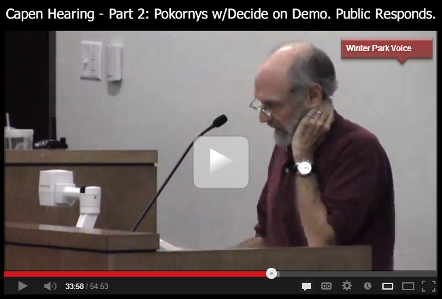 Unfortunately for the Commission, public comment during the meeting showed that many in the audience did not think that the Capen House matter was handled well – and were not ready to move on before letting the Commission know it. The Commissioners sat for most of the next hour as advocates for Capen House preservation spoke about the failure of the Mayor and Commissioners to protect Winter Park’s heritage and historic landmarks. Blame was laid and the Mayor and Commissioners were – not so gently – put back on the hook. Unfortunately for the Commission, public comment during the meeting showed that many in the audience did not think that the Capen House matter was handled well – and were not ready to move on before letting the Commission know it. The Commissioners sat for most of the next hour as advocates for Capen House preservation spoke about the failure of the Mayor and Commissioners to protect Winter Park’s heritage and historic landmarks. Blame was laid and the Mayor and Commissioners were – not so gently – put back on the hook.
The Public Comment portion of the Capen House hearing can be viewed in Part Two of the Capen House Hearing Video, starting at the nineteen minute point in the video (19:00). Each of the commenters featured below can be viewed starting at the point indicated at the end of each paragraph.
Comments by audience members – most of whom appeared to agree that the city must strengthen its commitment to historic preservation – included reminders of past demolitions, including demolition of the historic Annie Russell home (19:00). Winter Park resident Peggy Evans read a letter from Amy Jennings Evans, who grew up in Capen House, recalling Capen House social events attended by local luminaries including the founders of the Winderweedle Law Firm – the firm that employs the attorneys representing the Pokorny family. (21:10)
Betsy Owens, Executive Director of Casa Feliz, reminded the Commission that in the last two decades, “One out of every eight houses in Winter Park have been demolished – more than twice the national average.” Owens also pointed out – in answer to Commission fears about historic protections running afoul of state laws protecting property rights – that cities like St. Augustine and Jacksonville with stronger protective ordinances “are subject to the same state laws governing property rights that Winter Park is.” (30:30)
Kern: “Why are the Historic Preservation laws second class zoning laws?”
John Kern mentioned a Sentinel article quoting Mayor Bradley’s concern about the conflict between Historic Preservation laws and private property rights. Kern asked why preservation laws aren’t seen as just another type of zoning ordinance, commenting that “All of our zoning laws affect property rights . . . Why are the Historic Preservation laws second class zoning laws?” Kern reminded the Commissioners that “Zoning laws define the type of community we want to live in” adding that many Winter Parkers chose to live in the city “because of the history that this town has.”
Kern’s comments were interrupted with applause when he criticized SunTrust Bank’s role in rescinding the historic protection of Capen House – claiming that the bank had “used up a lot of goodwill in this community because of their actions.” (33:40)
Rogers: “I think we ought to tear this house down . . . we as a town, need a lesson.”
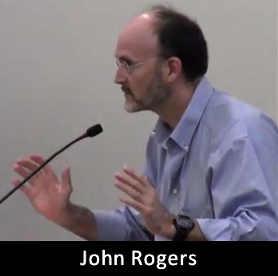 The most ferocious commentary of the evening – second only to former Capen House owner Clardy Malugen’s incendiary remarks (44:20) – was John Rogers’ sharply pointed jab at city governance of Winter Park’s cultural and historic treasures. Rogers, the grandson of Casa Feliz architect James Gamble Rogers, facetiously suggested to the commission that “I think we ought to tear this house down soon – and be done with it.” Rogers was clearly in an Old Testament frame of mind when he declared that “. . . we need a trumpet call to arms . . . a sacrificial lamb. I think we as a town, need a lesson.” Rogers’ fervor drew applause from the audience when he castigated city approval of fast food on the avenue and the boom in “McMansion” development as emblematic of values that “crappify this city’s brand.” The most ferocious commentary of the evening – second only to former Capen House owner Clardy Malugen’s incendiary remarks (44:20) – was John Rogers’ sharply pointed jab at city governance of Winter Park’s cultural and historic treasures. Rogers, the grandson of Casa Feliz architect James Gamble Rogers, facetiously suggested to the commission that “I think we ought to tear this house down soon – and be done with it.” Rogers was clearly in an Old Testament frame of mind when he declared that “. . . we need a trumpet call to arms . . . a sacrificial lamb. I think we as a town, need a lesson.” Rogers’ fervor drew applause from the audience when he castigated city approval of fast food on the avenue and the boom in “McMansion” development as emblematic of values that “crappify this city’s brand.”
Rogers ended his presentation with a question and a suggestion to the Commission: “My Question is: Is the function of a government to work for the good of the majority of the citizens, or for the financial benefit of a small influential minority?” Rogers called for “Mandatory Historic Preservation ordinances complete with not only sticks, but significant carrots . . . We need creative, out-of-the-box thinking – and we need it now.” (35:55)

6/10/13 Story Update
 Winter Park’s City Commission meets today at 3:30pm and, with the fate of Capen House still undecided amidst citizen indignation and rumored negotiations, the hearing promises to be lively – and possibly even productive. Winter Park’s City Commission meets today at 3:30pm and, with the fate of Capen House still undecided amidst citizen indignation and rumored negotiations, the hearing promises to be lively – and possibly even productive.
Last night, Commissioner Carolyn Cooper got out in front of the pack by issuing the Commission’s first public mea culpa in her emailed Cooper’s Perspective, “I believe the City Commission (myself included) made a mistake regarding our decision to remove the Capen House from Winter Park’s Register of Historic Places.”
In her newsletter, Cooper vowed to make amends: “At [Monday’s] Commission meeting I will seek the support of my fellow commissioners to empower the City Manager to explore all reasonable options to work with the property owners to delay the demolition and hopefully save this significant historic asset. Without the City’s intervention to delay the demolition, there may be little opportunity to formulate a plan to save this important piece of Winter Park’s history.”
Cooper & Bradley Declare Support for Delaying Demolition
 Cooper was not alone in her quest to find some sort of alternative to the impending demolition of Capen House. Cooper was not alone in her quest to find some sort of alternative to the impending demolition of Capen House.
On the same day that P&Z Director Jeff Briggs warned that “I met with the builder this morning and they are definitely moving ahead with demolition,” Mayor Bradley issued an urgent call to action in a May 30 email to city staffers, “While I would not advocate any specific course of action, as all the facts are not known or evident . . . I would suggest an administrative hold on the demolition permit for 30 days until all the facts could be sorted out. This is a decision I cannot take unilaterally and I also want to protect property rights. But something needs to happen soon.”
May: Bradley Considers City Purchase of Capen House. June: City Should Not Purchase
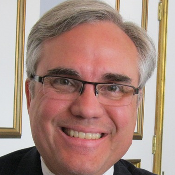 In one of a series of city emails obtained by the Voice, Mayor Bradley appears to have been searching for alternatives even before Jeff Briggs affirmed the Pokorny’s determination to demolish their recently purchased 128-year-old home. On May 29, Bradley floated an idea to City Manager Randy Knight: “If this property is lakefront, I would be very interested from a city’s perspective in purchasing it for Park land.” However, Bradley’s staff quickly reminded him that neighbors are often opposed to parks placed in the middle of residential neighborhoods. In one of a series of city emails obtained by the Voice, Mayor Bradley appears to have been searching for alternatives even before Jeff Briggs affirmed the Pokorny’s determination to demolish their recently purchased 128-year-old home. On May 29, Bradley floated an idea to City Manager Randy Knight: “If this property is lakefront, I would be very interested from a city’s perspective in purchasing it for Park land.” However, Bradley’s staff quickly reminded him that neighbors are often opposed to parks placed in the middle of residential neighborhoods.
By early June, Mayor Bradley’s position on a city rescue of Capen House appeared to have evolved. In a Sentinel article published on June 8, Bradley told reporter David Breen that, “I think that individuals need to band together and come up with a plan . . . I don’t believe it’s the city’s place to do that. … While I personally might wish for a different outcome [than demolition], it’s really not my decision.”
While it appears that the city’s politicians may be deciding that now is the time to stake out their public positions on Capen House and the city’s historic preservation policies, private discussions inside the city have been ongoing for weeks. Winter Park’s elected officials and top staffers have worked hard to understand how a simple Commission vote to rescue a bank’s collateral from a “significant loss in value” could create such an explosion of public response and media scrutiny.
Public & Media Response Rattles Commissioners
 On May 30, as the Capen House story began to break rapidly across multiple news outlets, Commissioner Sprinkel asked City Manager Randy Knight for help: “We are getting lots of heat from this and need the facts provided to us — provided to the public.” On the same day, Mayor Bradley complained to Randy Knight that “I’m getting lots of pings on this one–as if the Commission itself is out there demolishing the building.” In the same email Bradley asked for the second time in two days: “Would the City intervene to buy the property?” On May 30, as the Capen House story began to break rapidly across multiple news outlets, Commissioner Sprinkel asked City Manager Randy Knight for help: “We are getting lots of heat from this and need the facts provided to us — provided to the public.” On the same day, Mayor Bradley complained to Randy Knight that “I’m getting lots of pings on this one–as if the Commission itself is out there demolishing the building.” In the same email Bradley asked for the second time in two days: “Would the City intervene to buy the property?”
It was during this period of the city’s own examination of the facts of the case that Winter Park Voice requested and obtained a significant number of city documents. The Voice requested email documents generated during the period surrounding the 2011 granting of the Capen House Historic Designation and the 2012 period when the Designation was rescinded. Our request parameters were expected to also yield citizen email to the Mayor and Commissioners. After receiving requested documents from the city, we discovered that there were virtually no documents included from the 2011 period and no citizen email to the Mayor and Commissioners. The city explained that these gaps in their email search were likely the result of a technical problem with city servers.
City Staffer: Not Much Evidence to Support SunTrust’s Claims in Capen Case
Our examination of the city email we received, combined with our review of the entire SunTrust file did not reveal any proof submitted to the city by SunTrust supporting their claims that (a) Historic Designation reduces property values, or (b) that the homeowner, Clardy Malugen, engaged in “bad faith” tactical negotiations linked to the Historic Designation. These claims were made in SunTrust’s 8/17/12 letter to the city that summarized their case.
SunTrust’s claims were discussed at length among senior city staffers and elected officials – as shown in the following email excerpt discussing possible city response to press questions about the case:
|
“The circumstances surrounding the Capen House (520 N. Interlachen Ave.) makes this situation unique and unprecedented. In August 2011, when the application was approved by the City Commission to place the house on the Winter Park Historic Register, the city was not made aware the home was already under a foreclosure process by SunTrust. SunTrust was also not aware of the application for historic designation.
In September 2012, the request by SunTrust to rescind the historic designation on the Capen House was brought forward and the City Commission agreed with SunTrust’s position that:
- the owner was already in default on the mortgage when she asked the city to put the historic designation on the property
- the designation might hinder their options to recoup what was owed to them
- ‘the application was not made in good faith, that it was done for tactical negotiation reasons and the owner sought to use the designation as a basis for claiming a 50%+ discount to satisfy her debt to SunTrust’
The rescinding of the historic designation was unanimously approved by the Commission on September 24, 2012 based on the information presented above.” |
|
Email conversation among staffers discussing this proposal includes this conclusion presented by a senior staffer close to the case:
|
“The first point was the only one evidence was presented to support . . . The only evidence presented was that Ms. Melugen was in default on the mortgage and that her counter claims against SunTrust’s lending practices had not been upheld. There wasn’t any evidence presented to support the 2nd and 3rd points . . .” |
|
Proposed City Policy: Let’s Include Lenders When Deciding on Homeowner Requests
The same staff email that laid out SunTrust’s claims also suggests future policy option regarding Historical Designations:
|
“Moving forward, the City Commission could revise their policy to:
- direct staff to research whether there are any pending foreclosure lawsuits in the public record when an owner petitions for historic designation
- deny the request for such designation if under foreclosure proceedings
These actions would only apply to future requests and would help prevent this unusual situation from occurring again.”
|
|
 In a separate email (excerpt) to Randy Knight, Commissioner Steve Leary weighs in on the question of lender involvement in the city’s Historical Designation process: In a separate email (excerpt) to Randy Knight, Commissioner Steve Leary weighs in on the question of lender involvement in the city’s Historical Designation process:
“I also think it may be appropriate to notice any mortgager on future designations as they have a financial interest in the properties valuation, even prior to foreclosure proceedings.”
SunTrust, in their 8/17/12 letter to the city, also expressed a similar opinion:
|
“Where the property owner’s equity in the real property is minimal, as was the case here, the mortgage lender is, in economic reality, the equitable owner of the property whose rights will be substantially affected by the contemplated historic designation actions of the applicant. If all adjacent property owners are worthy of receiving a notice of the contemplated historic designation actions of the applicant under the City Code, wouldn’t the applicant’s lender also be worthy of receiving such a notice from the City?” |
|
Did Fear of Lawsuit Spur Commission?
A closer look at the interests of SunTrust reveals that the City of Winter Park is a customer of the bank. This fact was confirmed by the city in response to questions from the Voice about the city’s relationship and interaction with the bank. We attempted to confirm reports that one factor motivating the Commission vote in SunTrust’s favor was the city’s fear that they might be sued by their own bank.
We were unable to find any evidence that SunTrust threatened to sue the city if the Capen House Historic Designation was not rescinded. However, in response to our questions, city staff did reveal that despite the absence of any lawsuit threat by SunTrust, City Attorney Brown “did give advice to the Commission that SunTrust had a reasonable argument that might prevail in court.”
Historic Designation No Guarantee of Immunity From Demolition
An analysis by the city’s lead Historic Preservation staffer, Lindsey Hayes, indicates that even Historic Registry status does not automatically confer total immunity from demolition. In a recent email explaining how demolition is treated in the Historic Preservation context, Ms. Hayes points out that “The ordinance does not include a direct prohibition against demolition. It describes the process and the issues for the board to consider. A total prohibition in the ordinance might result in a takings claim so a defensible process is the important key . . . Each case would have to stand on its own merit . . .”
Comments by others at the city indicate that while the process may contemplate the possibility of allowing an owner to demolish a Historically Protected home, the owner would have to convince a city board that the home was essentially unsalvageable.
City Attorney Assures City: We Had “Legal Right” to Remove Historic Designation.
On May 31, City Attorney Larry Brown submitted to city staff this concise recap of the legal rationale for the city’s handling of the Historical Designation of the Capen House:
|
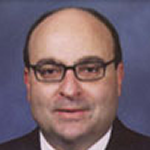 “The former owner had already lost the property at the time Sun Trust requested the resolution revoking historical designation. Sun Trust had a foreclosure judgment and took title at the foreclosure sale. The former owner had appealed the judgment BUT had not posted a bond to stay the sale nor had she taken the legal action needed to stop Sun Trust from acquiring title. Moreover, she has since lost that appeal. Therefore, we were dealing with the legal owner of the property, and that owner, (Sun Trust), requested the removal of the historic designation.Under the City’s Code, the designation is granted by Commission resolution. There are no prohibitions against a Commission resolution removing the designation at the request of the owner, and that is what occurred here. The owner, Sun Trust, requested and received a resolution removing the designation. The Commission could do that because there was no federal, state or local law prohibiting that action. (This property was not on a federal or state historic designation register). “The former owner had already lost the property at the time Sun Trust requested the resolution revoking historical designation. Sun Trust had a foreclosure judgment and took title at the foreclosure sale. The former owner had appealed the judgment BUT had not posted a bond to stay the sale nor had she taken the legal action needed to stop Sun Trust from acquiring title. Moreover, she has since lost that appeal. Therefore, we were dealing with the legal owner of the property, and that owner, (Sun Trust), requested the removal of the historic designation.Under the City’s Code, the designation is granted by Commission resolution. There are no prohibitions against a Commission resolution removing the designation at the request of the owner, and that is what occurred here. The owner, Sun Trust, requested and received a resolution removing the designation. The Commission could do that because there was no federal, state or local law prohibiting that action. (This property was not on a federal or state historic designation register).
George may delay demolition if allowed by Code to see if a group of citizens can implement a “Casa Feliz solution”. That is a policy decision for you and the Commission. But, I can assure you that the Commission was dealing with the legal owner, and that owner, (Sun Trust), requested the action, and the Commission had the legal right in its discretion to resolve that the property would have its historic designation removed.” |
|
City Attorney: City Code May Allow Our Delay of Demolition Permit.
Despite Attorney Brown’s assurance that city Building Director George Wiggins may delay demolition of Capen House “if allowed by Code”, the city had not moved in that direction as of early last week. As reported on June 4 by City Communications Director, Clarissa Howard, the city had “Nothing new to report on the Capen House…demo has not been put on hold…no word on our end on other plans for the house…”
Rumors abound that some sort of deal or decisive city action is imminent. Today’s Commission meeting may give city residents a clue as to whether Capen House will live on.
5/28/13 Story
 In mid-May, as word got out that a Demolition Notice had been posted at the Historic Capen House Residence, a small group of Winter Parkers took notice. In mid-May, as word got out that a Demolition Notice had been posted at the Historic Capen House Residence, a small group of Winter Parkers took notice.
Within days, Betsy Owens, Director of the city’s beloved Casa Feliz Historic Home Museum, broke the Capen House story in her Preservation Winter Park blog and issued a call to the wider Winter Park community:
“There are precious few houses in the city of Winter Park as old as the Capen House, located at 520 North Interlachen Avenue. Built in 1885 for James S. Capen, one of the city’s early settlers, the house was initially constructed in a Folk Victorian style, and celebrated by the local community . . . Last week a demolition permit was granted by the City of Winter Park, allowing the 128-year-old home to be razed after June 13. Preservation-minded people are scratching their heads to connect the dots. How did we get from there to here?”
Preservation Winter Park Article
Ms. Owens has been “here” before. She’s seen what Winter Parkers can do when a historic Winter Park home is threatened with demolition. This time, the journey from preservation to demolition was started with a single step taken by Winter Park’s own City Commission — a unanimous decision to rescind the Historic Registry listing of Capen House in September, 2012.
The Commission’s 5 – 0 vote granted a request by SunTrust bank asking the city to rescind the listing — a request motivated by the bank’s fear that historic status might reduce their proceeds from their foreclosure sale of the property.
When Capen House was sold for $2 million six months later, the new owner, John Pokorny, filed an application to demolish the historic home. More about this later.
Last week, the Voice contacted the WP Building Department and learned that the Capen House Demolition Permit is still in process — moving among city departments who must sign their approval before the permit is actually issued.
Demolition Permit Application
Narrow Escape Last Time Bulldozers Threatened Interlachen Avenue Landmark.
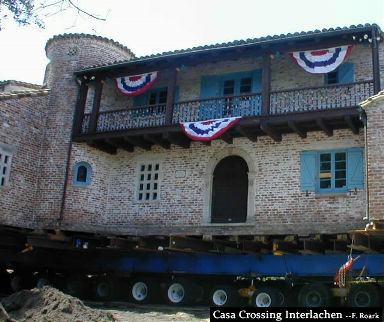 In 2000, Casa Feliz narrowly escaped destruction when it was slated for demolition by the new property owner, Wayne Heller. In 2000, Casa Feliz narrowly escaped destruction when it was slated for demolition by the new property owner, Wayne Heller.
Mr. Heller was quoted in the Orlando Sentinel as saying “If it’s [Casa Feliz] left sitting on the property, I’ll bulldoze it.”
The December, 2000 Sentinel story entitled “Owner Of Casa Feliz Gets Tired Of Waiting” paints a picture of a wealthy, frustrated property owner who misunderstood the values of his neighbors:
“Heller, who bought Casa Feliz for $3.4 million, had originally thought he would be well under way by April in building a 12,000-square-foot Mediterranean-style home.
‘Knowing what I know now, I probably wouldn’t have done it,’ Heller said of buying the property.
What he discovered, after starting demolition of Casa Feliz in September, was a potent force of Winter Park residents angered by a loss of older homes and by the unexpected assault on Casa Feliz. Responding to protests, the city halted demolition, outraging Heller but allowing for the hatching of a rescue plan.”
Click the button below to read the full Sentinel article.
Sentinel Article: “Owner of Casa”
In July, 2011 the Sentinel featured a follow-up story on the Heller property entitled “Mega-Mansion Emerges where Historic Casa Feliz Once Stood” detailing Heller’s decade-long building schedule and his decision to double the originally-planned size of the mansion,
|
“Despite the rush to demolish Casa Feliz, the Hellers didn’t build their new, larger house once the historic structure was moved across Interlachen Avenue to city-owned property. Instead of the two-year timetable they had envisioned, it has taken more than 10 years for them to even start the construction of their dream home — a 27,000-square-foot mansion they now hope to finish as soon as next year.” |
|
Sentinel Article: “Mega-Mansion Emerges”
Will Winter Parkers Mount a “Potent Force” This Time Around?
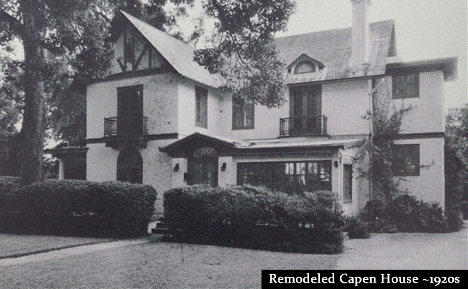 Betsy Owens recently posted a note in her blog that she has been “surprised by the level of interest” in her original Capen House blog post, noting that “In the last 32 hours, more than 1800 people have visited this site. It shows that overwhelmingly, people still care about Winter Park’s retaining its unique historic value.” Betsy Owens recently posted a note in her blog that she has been “surprised by the level of interest” in her original Capen House blog post, noting that “In the last 32 hours, more than 1800 people have visited this site. It shows that overwhelmingly, people still care about Winter Park’s retaining its unique historic value.”
Other Winter Parkers who have added their voices to the discussion include Arthur Blumenthal, Director Emeritus, Cornell Fine Arts Museum at Rollins College (click here to read his column) and Linda Kulmann, President of the Winter Park Historical Association (click here to read her column).
The consensus among the official and unofficial “preservation-minded people” who spoke with the Voice is that historic preservation enriches its citizens’ quality of life and economic well-being. They point to studies of Heritage Tourism and rising home values in historic neighborhoods as proof that preservation “pays” – and argue that it is the duty of city staff and elected officials to strongly promote historic preservation.
This argument, however implicit, was also on trial at Winter Park’s City Commission on September 24, 2012 (see video below). However, the issue explicitly brought forward by SunTrust Bank was far more narrow.
SunTrust Letter to City: We Can Sell Capen House for More if You Rescind Historic Status.
SunTrust Letter
According to a case summary submitted to the city by SunTrust Bank, the bank’s sole concern was its ability to fully recoup its $2.1 million loan in a foreclosure sale of the historic Capen House property – which had been placed on the city’s Historic Register in 2011 by homeowner Clardy Malugen. Jason Searl, the bank’s attorney summed it up this way:
|
“SunTrust’s ability to market and sell the Property to a third party purchaser and recoup its original loan amount is severely inhibited by this series of events set in motion by Malugen during the midst of intense litigation with her lender.” Mr. Searl claimed that Ms. Malugen “submitted the application for bad faith, tactical reasons and sought to use the designation as a basis for claiming a 50%+ discount to satisfy her debt to SunTrust.” —Excerpted from SunTrust case summary submitted to city on 8/17/12. |
|
|
Enjoying this Article?
Our Investigative Reporting, In-Depth Research and Video Coverage are Giving Our Readers a Clearer, Deeper View of City Policies & Issues.We’ve Made a Commitment to Keep You Informed.
Please Consider Supporting our Journalism.
Click to Contribute, Now. |
|
For some, if not all the commissioners, it was Mr. Searls’ claims about Ms. Malugen’s motivation for listing Capen House in the Historic Register, and the bank’s pursuit of its collateral that appeared to carry the day.
Six Minute Commission Hearing: Two Questions. No Capen House Discussion.
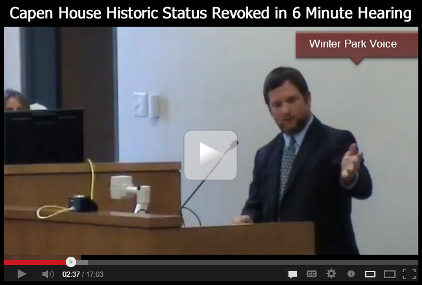 In a six minute hearing that yielded two questions, no public comment and a 5 – 0 vote to strip the Capen house of its registry listing, there was no discussion of whether the home had sufficient historic value to merit its inclusion on the city’s Historic Register – regardless of the perceived intentions of its owner. In a six minute hearing that yielded two questions, no public comment and a 5 – 0 vote to strip the Capen house of its registry listing, there was no discussion of whether the home had sufficient historic value to merit its inclusion on the city’s Historic Register – regardless of the perceived intentions of its owner.
One revealing footnote in the SunTrust summary was their admission that Ms. Malugen, had, in fact, first applied to list Capen House in the Winter Park Historic Registry of Homes in 2006, shortly after she purchased the property. Ms. Malugen told the Voice that this earlier application was put on hold by her during an extended period when she sought and was ultimately granted permits to add a garage and other extensive improvements to the property. According to Malugen, the improvements totaled approximately $700,000 in addition to the $2.6 million purchase price of the property.
2011 Capen Registry Documents
Malugen: “I was not notified” of City Hearing. “Foreclosure Appeal Still Pending.”
Ms. Malugen’s original 2006 Registry application was not discussed at the hearing. Malugen says that she did not receive notice of the hearing and did not know that the hearing was being held. Another wrinkle in the case that did not come out at the hearing was the fact that Malugen had filed an appeal of the Suntrust foreclosure which was still pending in Circuit Court – an action that conceivably could have resulted in a reversal of the SunTrust foreclosure. (Ms. Malugen’s appeal failed several months later.)
Did Commission Revoke Historic Status for the Wrong Reason?
Voice interviews with city residents who are familiar with the case indicate that some observers – and possibly some commissioners – believe that SunTrust’s rescission request was based primarily on their assertion that Ms. Malugen was not entitled to apply for Historic Registry status for Capen House. Court records show that SunTrust had filed a Lis Pendens document with the court and started a foreclosure action against Ms. Malugen in 2010, the year before she applied for Registry status.
However, a review of SunTrust’s case summary submitted to the city on 8/17/12 does not reveal any explicit argument that Ms. Malugen was not entitled to file for Registry status. Instead, SunTrust appeared to be arguing three key points:
1. SunTrust faulted the city for not informing them that Malugen was applying to place Capen House on the Historic Register – giving them the same advance notice that neighbors surrounding the property at 520 N. Interlachen Avenue received. The bank conceded that city regulations do not require notice to lenders, but argued that SunTrust was, as they put it, “in economic reality, the equitable owner” of the property. The bank’s support for this argument appears to be that Ms. Malugen had not yet paid off, or significantly paid down, her home loan.
2. SunTrust questioned Ms. Malugen’s motives, claiming that she was insincere in her application for Historic Status – and was doing so for “tactical” reasons to gain leverage in her foreclosure negotiations with SunTrust.
3. SunTrust asserted that by allowing Capen House to remain on the Winter Park Register of Historic Homes the city would “severely” limit SunTrust’s ability to recoup its $2.1 million loan on the property. This assertion appears to be based on SunTrust’s belief that a home with Historic Registry Status is de-valued by the protections and oversight that are afforded to Historic Registry properties.
Capen Registry Rescission
How Realistic Was SunTrust’s Assertion That Historic Register Home on Prime Lakefront Lot Would Lose Money?
Winter Park Voice researched real estate sales data for Interlachen Avenue for a ten-year period starting in 2003. We found only one case – a $1,990,000 home sale in 2004 – where the sales price of a lakefront residence on Interlachen Avenue fell below the $2 million mark. The two Interlachen lakefront homes sold after 2010 – not including the $2,000,000 foreclosure sale of Ms. Malugen’s home (in March, 2013) – were purchased for $3.2 and $4.9 million respectively.
Kelly Price, the realtor who represented both the buyer and seller in the Capen House foreclosure sale, originally listed the home for $3.2 million in August, 2012. By February, 2013, the listing price had dropped to $2,450,000. In March, the home sold to the Pokorny family for $2,000,000.
The Voice obtained a recent appraisal on Capen House performed by Meridian Residential Appraisal on behalf of SunTrust Bank. The appraisal, dated June 17, 2011, values Capen House at $2.7 million.
2011 Capen House Appraisal
New Owner Says Capen House Has Serious Problems. Plans to Demolish Home, Replace It With “Contemporary Farmhouse.”
The Voice attempted to contact John Pokorny through a company he owns to ask about his plans for Capen House. Multiple attempts were made to reach Mr. Pokorny. By press time, Mr. Pokorny had not responded to our request for an interview. He did, however, speak with the author of Preservation Winter Park who reports:
|
“The new owners, John and Betsy Pokorny, intend to raze the house and build a new one in its place. The house, John told me, has serious mold and foundation problems, and the layout is untenable for his family’s needs. He has contracted with a celebrated local architect and intends to build a ‘contemporary farmhouse,’ actually smaller than the Capen House.” |
|
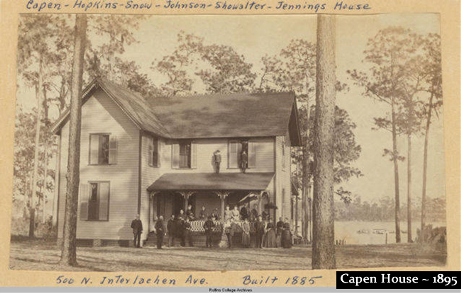 According to Preservation Winter Park, Pokorny has “offered to donate the house to any group willing to move it, and contribute $10,000 toward the move.” According to Preservation Winter Park, Pokorny has “offered to donate the house to any group willing to move it, and contribute $10,000 toward the move.”
Click here, here and here to learn more about Capen House history from Rollins College Historical Archives. Click to read Historic Preservation Economic Impact Study here.
Winter Park Voice spoke with construction and design professionals familiar with Capen House. None of these sources has knowledge of mold or foundation problems other than “some settling” that is considered typical for well-maintained 100+ year-old homes.
2008 Capen Appraisal Reports No Problems With “Livability” or “Structural Integrity” of Property.
An appraisal of Capen House done in 2008 for Regions Bank notes that the home was “in overall good/excellent condition with no deferred maintenance noted. There was no functional or external obsolescence noted.” The report also verifies that there were no apparent physical deficiencies or adverse conditions that affect the “livability, soundness, or structural integrity of the property.” The 2011 Appraisal does note that the owner reported possible structural issues with the carriage house.
2008 Capen House Appraisal
Significant structural problems, mold or other issues that can seriously impact a home are required to be disclosed in a Seller’s Property Disclosure statement. These statements are submitted to buyers prior to the closing of each sale. The Voice contacted the sales agent, Kelly Price asking for a copy of the Disclosure. Ms. Price did not respond to our request by press time.
Unanswered Questions
Winter Park Voice has contacted many city government insiders, including members of the city Historic Preservation Board, the Mayor & Commissioners, City Manager and City Attorney. With one or two (staff) exceptions, none have responded to questions regarding Capen House and City Historical Preservation Policy.
The Voice also contacted SunTrust attorney Jason Searl, who declined comment.
During the 9/24/12 hearing, City Attorney Brown noted that there is no specific procedure in city code for rescinding Historic Landmark designation. The Voice submitted questions to city staff, officials and board members attempting to ascertain whether the rescission process the Commission followed on 9/24/12 is the process by which future rescissions will be accomplished.
We also asked whether the City Commission is empowered to rescind any Historic Landmark designation in response to a property owner request.
Clarissa Howard, Director of City Communications, has indicated that some answers may be forthcoming. Winter Park Voice will include city responses in future updates.
|
 On Friday, the Sentinel broke the news that the Capen House will be cut into two pieces and floated across Lake Osceola to the grounds of the Polasek Museum – if Winter Parkers are willing to pony up $650,000. It’ll have to be a fast pony, too.In an interview with the Voice, Debbie Komanski, Executive Director of the Polasek Museum, confirmed that all the money will have to be raised and the house moved within the next seven to eight months. Komanski stressed that for Winter Parkers, “Now is the time to commit, to step forward” with funds to move Capen House.
On Friday, the Sentinel broke the news that the Capen House will be cut into two pieces and floated across Lake Osceola to the grounds of the Polasek Museum – if Winter Parkers are willing to pony up $650,000. It’ll have to be a fast pony, too.In an interview with the Voice, Debbie Komanski, Executive Director of the Polasek Museum, confirmed that all the money will have to be raised and the house moved within the next seven to eight months. Komanski stressed that for Winter Parkers, “Now is the time to commit, to step forward” with funds to move Capen House.

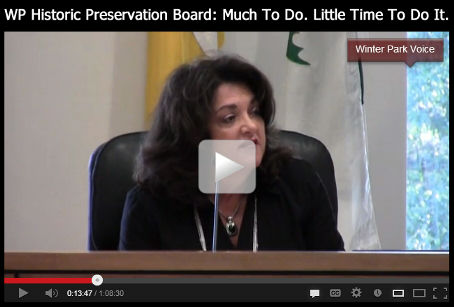
 HPB member, Candace Chemtob noted “I think we’re really going to have our work cut out to go back through the ordinance and really re-write those codes so that they’re extremely clear. That doesn’t give us much time . . .” Ms. Chemtob reminded the board that it took the board “a year or two” to review the original preservation ordinance. Ms. Chemtob’s remarks can be viewed at 16:55 on the WPV video of the HPB hearing (click video image above).
HPB member, Candace Chemtob noted “I think we’re really going to have our work cut out to go back through the ordinance and really re-write those codes so that they’re extremely clear. That doesn’t give us much time . . .” Ms. Chemtob reminded the board that it took the board “a year or two” to review the original preservation ordinance. Ms. Chemtob’s remarks can be viewed at 16:55 on the WPV video of the HPB hearing (click video image above).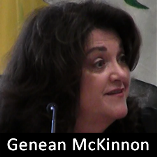
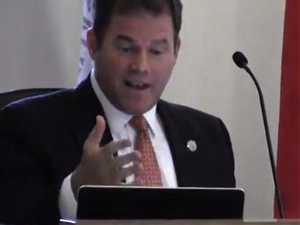 Commissioner Steve Leary (and/or the city residents he talks to) also appeared to feel the sting of preservation-minded sentiment more than most. In his response to the conciliatory
Commissioner Steve Leary (and/or the city residents he talks to) also appeared to feel the sting of preservation-minded sentiment more than most. In his response to the conciliatory 

 Commissioner McMacken supported the idea of creating a Task Force stating that “This really needs to be a community conversation that perhaps this Task Force . . . would come back to us and say ‘Here’s what we value in our city’.” McMacken expressed some misgivings about the Mayor’s idea to examine and shape policy depending largely on the city’s advisory boards, saying “I’m a little hesitant of putting it out to four or five different boards.” McMacken suggested that the Task Force may be better suited to make recommendations “in a more coherent form.”
Commissioner McMacken supported the idea of creating a Task Force stating that “This really needs to be a community conversation that perhaps this Task Force . . . would come back to us and say ‘Here’s what we value in our city’.” McMacken expressed some misgivings about the Mayor’s idea to examine and shape policy depending largely on the city’s advisory boards, saying “I’m a little hesitant of putting it out to four or five different boards.” McMacken suggested that the Task Force may be better suited to make recommendations “in a more coherent form.” ordinances may not need to be changed, speculating that they may be “up to muster and up to speed – and what we have is an implementation issue.” Commission Commissioner Cooper agreed with the Mayor on implementation being an issue, saying “I think that’s exactly what we have . . .”
ordinances may not need to be changed, speculating that they may be “up to muster and up to speed – and what we have is an implementation issue.” Commission Commissioner Cooper agreed with the Mayor on implementation being an issue, saying “I think that’s exactly what we have . . .” Later in the hearing, Commissioner Cooper brought the discussion back to the issue that has generated so much community passion and scrutiny of the city’s policies and actions – the threatened demolition of Capen House. Cooper pointed out a city code provision that, had it been implemented, might have resulted in a closer look at what would be lost and what would be gained by granting SunTrust Bank’s request to rescind the Historic Registry status of Capen House: “One of the functions that our code allows is that the Historic Preservation Board is to recommend for or against demolitions on properties that are on the Florida Master Site File Plan. Well the Capen House was there – but somehow . . . it fell off the radar.”
Later in the hearing, Commissioner Cooper brought the discussion back to the issue that has generated so much community passion and scrutiny of the city’s policies and actions – the threatened demolition of Capen House. Cooper pointed out a city code provision that, had it been implemented, might have resulted in a closer look at what would be lost and what would be gained by granting SunTrust Bank’s request to rescind the Historic Registry status of Capen House: “One of the functions that our code allows is that the Historic Preservation Board is to recommend for or against demolitions on properties that are on the Florida Master Site File Plan. Well the Capen House was there – but somehow . . . it fell off the radar.”


 Attorney Cheek went on to propose that “I don’t think you ought to take any action, to tell you the truth. I’m not sure what action you could take considering it [demolition permit hearing] wasn’t agenda’d anyway.”
Attorney Cheek went on to propose that “I don’t think you ought to take any action, to tell you the truth. I’m not sure what action you could take considering it [demolition permit hearing] wasn’t agenda’d anyway.” Commissioner Sprinkel immediately echoed Bradley’s sentiment, adding that the 30 day concession was “Very good news.”
Commissioner Sprinkel immediately echoed Bradley’s sentiment, adding that the 30 day concession was “Very good news.” McMackin summed up the feeling of some in the preservation community that Capen House “may not be the greatest of historical structures, but it’s one of ours and that may be as historic as we get in this community.”
McMackin summed up the feeling of some in the preservation community that Capen House “may not be the greatest of historical structures, but it’s one of ours and that may be as historic as we get in this community.” Leary admitted his fear of litigation by the Pokornys stating that “I don’t need a $40 million lawsuit/judgment against the city.”
Leary admitted his fear of litigation by the Pokornys stating that “I don’t need a $40 million lawsuit/judgment against the city.” During a discussion of alternatives the city could pursue, City Attorney Larry Brown revealed that the Commission did, in fact, have a legally defensible way to delay the demolition of Capen House for 30 to 60 days. Brown commented that, if challenged in court, a delay by the city in defense of community interests probably would be ruled appropriate – with a likely worst case awarding minimal damages to the Pokornys. However, Brown warned that a longer delay would put the city in jeopardy.
During a discussion of alternatives the city could pursue, City Attorney Larry Brown revealed that the Commission did, in fact, have a legally defensible way to delay the demolition of Capen House for 30 to 60 days. Brown commented that, if challenged in court, a delay by the city in defense of community interests probably would be ruled appropriate – with a likely worst case awarding minimal damages to the Pokornys. However, Brown warned that a longer delay would put the city in jeopardy. Sarah Sprinkel, clearly relieved that the city would not be fighting this particular battle, commented “I think this went very well.” She then revealed the strain of dealing with the onslaught of email and negative community sentiment this issue has generated: “It has been very hard to read – not just the paper – but all the emails that have been very blaming. It’s been a very hurtful thing for us and for everybody . . . I hope that everybody out there can move forward with this and stop the blaming.”
Sarah Sprinkel, clearly relieved that the city would not be fighting this particular battle, commented “I think this went very well.” She then revealed the strain of dealing with the onslaught of email and negative community sentiment this issue has generated: “It has been very hard to read – not just the paper – but all the emails that have been very blaming. It’s been a very hurtful thing for us and for everybody . . . I hope that everybody out there can move forward with this and stop the blaming.” Sprinkel’s expression of relief and hope for reconciliation were followed by Commissioner Cooper’s call for a re-examination of the city’s Historic Preservation ordinance and a request that the city study ordinances in cities renowned for their preservation efforts – cities like Coral Gables and St. Augustine. Mayor Bradley agreed that the Commission should set aside time at the next Commission meeting to discuss preservation rules and procedures.
Sprinkel’s expression of relief and hope for reconciliation were followed by Commissioner Cooper’s call for a re-examination of the city’s Historic Preservation ordinance and a request that the city study ordinances in cities renowned for their preservation efforts – cities like Coral Gables and St. Augustine. Mayor Bradley agreed that the Commission should set aside time at the next Commission meeting to discuss preservation rules and procedures.
 The most ferocious commentary of the evening – second only to former Capen House owner Clardy Malugen’s incendiary remarks (44:20) – was John Rogers’ sharply pointed jab at city governance of Winter Park’s cultural and historic treasures. Rogers, the grandson of Casa Feliz architect James Gamble Rogers, facetiously suggested to the commission that “I think we ought to tear this house down soon – and be done with it.” Rogers was clearly in an Old Testament frame of mind when he declared that “. . . we need a trumpet call to arms . . . a sacrificial lamb. I think we as a town, need a lesson.” Rogers’ fervor drew applause from the audience when he castigated city approval of fast food on the avenue and the boom in “McMansion” development as emblematic of values that “crappify this city’s brand.”
The most ferocious commentary of the evening – second only to former Capen House owner Clardy Malugen’s incendiary remarks (44:20) – was John Rogers’ sharply pointed jab at city governance of Winter Park’s cultural and historic treasures. Rogers, the grandson of Casa Feliz architect James Gamble Rogers, facetiously suggested to the commission that “I think we ought to tear this house down soon – and be done with it.” Rogers was clearly in an Old Testament frame of mind when he declared that “. . . we need a trumpet call to arms . . . a sacrificial lamb. I think we as a town, need a lesson.” Rogers’ fervor drew applause from the audience when he castigated city approval of fast food on the avenue and the boom in “McMansion” development as emblematic of values that “crappify this city’s brand.”


 Cooper was not alone in her quest to find some sort of alternative to the impending demolition of Capen House.
Cooper was not alone in her quest to find some sort of alternative to the impending demolition of Capen House. In one of a series of city emails obtained by the Voice, Mayor Bradley appears to have been searching for alternatives even before Jeff Briggs affirmed the Pokorny’s determination to demolish their recently purchased 128-year-old home. On May 29, Bradley floated an idea to City Manager Randy Knight: “If this property is lakefront, I would be very interested from a city’s perspective in purchasing it for Park land.” However, Bradley’s staff quickly reminded him that neighbors are often opposed to parks placed in the middle of residential neighborhoods.
In one of a series of city emails obtained by the Voice, Mayor Bradley appears to have been searching for alternatives even before Jeff Briggs affirmed the Pokorny’s determination to demolish their recently purchased 128-year-old home. On May 29, Bradley floated an idea to City Manager Randy Knight: “If this property is lakefront, I would be very interested from a city’s perspective in purchasing it for Park land.” However, Bradley’s staff quickly reminded him that neighbors are often opposed to parks placed in the middle of residential neighborhoods. On May 30, as the Capen House story began to break rapidly across multiple news outlets, Commissioner Sprinkel asked City Manager Randy Knight for help: “We are getting lots of heat from this and need the facts provided to us — provided to the public.” On the same day, Mayor Bradley complained to Randy Knight that “I’m getting lots of pings on this one–as if the Commission itself is out there demolishing the building.” In the same email Bradley asked for the second time in two days: “Would the City intervene to buy the property?”
On May 30, as the Capen House story began to break rapidly across multiple news outlets, Commissioner Sprinkel asked City Manager Randy Knight for help: “We are getting lots of heat from this and need the facts provided to us — provided to the public.” On the same day, Mayor Bradley complained to Randy Knight that “I’m getting lots of pings on this one–as if the Commission itself is out there demolishing the building.” In the same email Bradley asked for the second time in two days: “Would the City intervene to buy the property?” In a separate email (excerpt) to Randy Knight, Commissioner Steve Leary weighs in on the question of lender involvement in the city’s Historical Designation process:
In a separate email (excerpt) to Randy Knight, Commissioner Steve Leary weighs in on the question of lender involvement in the city’s Historical Designation process: “The former owner had already lost the property at the time Sun Trust requested the resolution revoking historical designation. Sun Trust had a foreclosure judgment and took title at the foreclosure sale. The former owner had appealed the judgment BUT had not posted a bond to stay the sale nor had she taken the legal action needed to stop Sun Trust from acquiring title. Moreover, she has since lost that appeal. Therefore, we were dealing with the legal owner of the property, and that owner, (Sun Trust), requested the removal of the historic designation.Under the City’s Code, the designation is granted by Commission resolution. There are no prohibitions against a Commission resolution removing the designation at the request of the owner, and that is what occurred here. The owner, Sun Trust, requested and received a resolution removing the designation. The Commission could do that because there was no federal, state or local law prohibiting that action. (This property was not on a federal or state historic designation register).
“The former owner had already lost the property at the time Sun Trust requested the resolution revoking historical designation. Sun Trust had a foreclosure judgment and took title at the foreclosure sale. The former owner had appealed the judgment BUT had not posted a bond to stay the sale nor had she taken the legal action needed to stop Sun Trust from acquiring title. Moreover, she has since lost that appeal. Therefore, we were dealing with the legal owner of the property, and that owner, (Sun Trust), requested the removal of the historic designation.Under the City’s Code, the designation is granted by Commission resolution. There are no prohibitions against a Commission resolution removing the designation at the request of the owner, and that is what occurred here. The owner, Sun Trust, requested and received a resolution removing the designation. The Commission could do that because there was no federal, state or local law prohibiting that action. (This property was not on a federal or state historic designation register).

 In 2000, Casa Feliz narrowly escaped destruction when it was slated for demolition by the new property owner, Wayne Heller.
In 2000, Casa Feliz narrowly escaped destruction when it was slated for demolition by the new property owner, Wayne Heller. Betsy Owens recently posted a note in her blog that she has been “surprised by the level of interest” in her original Capen House blog post, noting that “In the last 32 hours, more than 1800 people have visited this site. It shows that overwhelmingly, people still care about Winter Park’s retaining its unique historic value.”
Betsy Owens recently posted a note in her blog that she has been “surprised by the level of interest” in her original Capen House blog post, noting that “In the last 32 hours, more than 1800 people have visited this site. It shows that overwhelmingly, people still care about Winter Park’s retaining its unique historic value.”
 According to
According to 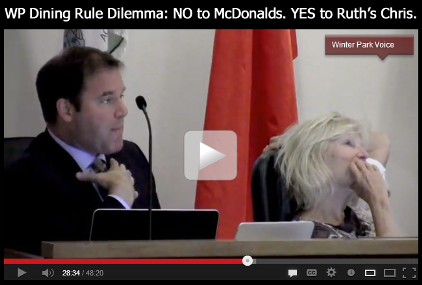
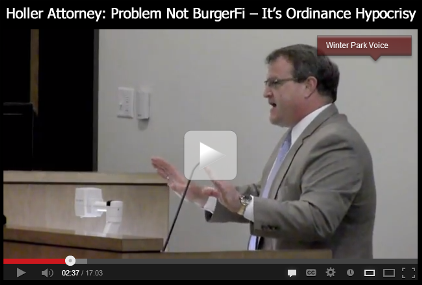

 It took ten months, but the city has resurrected last year’s debate about what kind of businesses – specifically restaurants – are welcome on Park Avenue. On Monday, May 13, the City Commission will consider modifying the ordinance that defines which types of restaurants are acceptable.
It took ten months, but the city has resurrected last year’s debate about what kind of businesses – specifically restaurants – are welcome on Park Avenue. On Monday, May 13, the City Commission will consider modifying the ordinance that defines which types of restaurants are acceptable.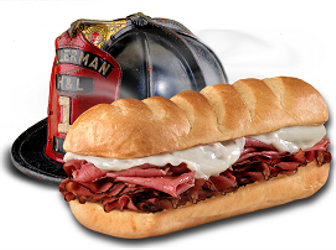
 In an interview with the Voice last week, Planning and Zoning Director, Jeff Briggs revealed that the city looked to an historic shopping district in south Florida as inspiration for the city’s new “Fine Dining” guidelines: “The new ordinance language being proposed for the city’s definition of permitted fine dining and fast casual restaurants is modeled on the standards established for the historic Worth Avenue district in Palm Beach, Florida.
In an interview with the Voice last week, Planning and Zoning Director, Jeff Briggs revealed that the city looked to an historic shopping district in south Florida as inspiration for the city’s new “Fine Dining” guidelines: “The new ordinance language being proposed for the city’s definition of permitted fine dining and fast casual restaurants is modeled on the standards established for the historic Worth Avenue district in Palm Beach, Florida.
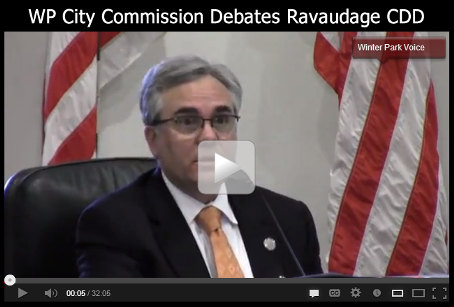
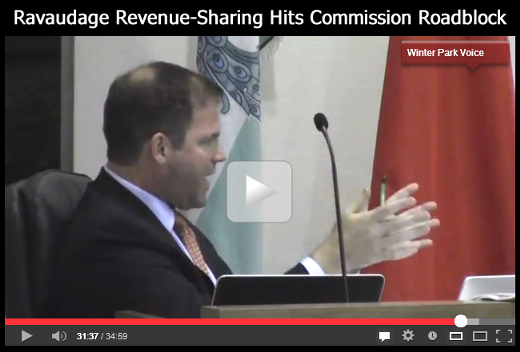

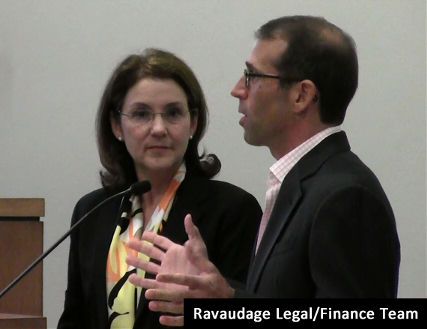
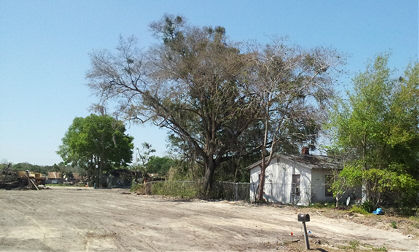 City Development Director, Dori Stone, Mr. Bellows and others at the city have defined the Ravaudage development as a “blighted” section of the city with poor infrastructure. Advocates of the development proposal have leaned heavily on this designation to justify the extraordinary support being asked of the city.
City Development Director, Dori Stone, Mr. Bellows and others at the city have defined the Ravaudage development as a “blighted” section of the city with poor infrastructure. Advocates of the development proposal have leaned heavily on this designation to justify the extraordinary support being asked of the city.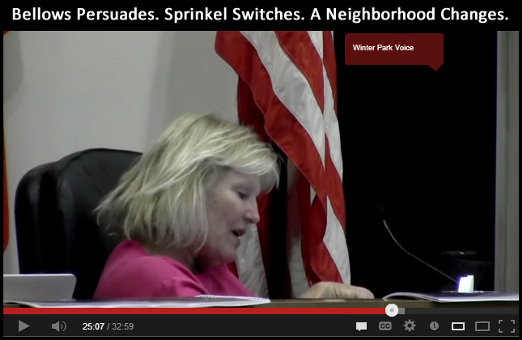



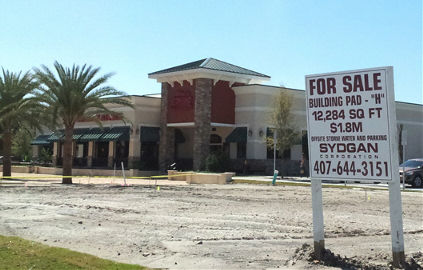 Longtime Winter Park developer, Dan Bellows, has been assembling a 54 acre patchwork of properties on the corner of Lee Road and 17-92 for well over a decade. And now, after talking to City Hall for years about his Ravaudage development, he’s within weeks of securing a Community Development District (CDD) “partnership” with the city.
Longtime Winter Park developer, Dan Bellows, has been assembling a 54 acre patchwork of properties on the corner of Lee Road and 17-92 for well over a decade. And now, after talking to City Hall for years about his Ravaudage development, he’s within weeks of securing a Community Development District (CDD) “partnership” with the city.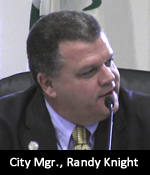 In an interview with the Voice on Friday, City Manager Randy Knight characterized the proposed CDD as a sort of “Homeowners Association” writ large – “a governmental entity” with “certain powers” including the authority to “assess properties within that district for infrastructure . . . and only within the district. No properties excluded from the district can be assessed. It can build infrastructure; it can bond using tax-exempt debt, which is a huge
In an interview with the Voice on Friday, City Manager Randy Knight characterized the proposed CDD as a sort of “Homeowners Association” writ large – “a governmental entity” with “certain powers” including the authority to “assess properties within that district for infrastructure . . . and only within the district. No properties excluded from the district can be assessed. It can build infrastructure; it can bond using tax-exempt debt, which is a huge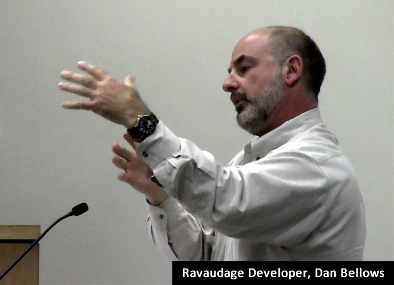
 –Traffic impact
–Traffic impact
Recent Comments